Technology - ENA English
Technology
Preparations Underway to Integrate Artificial Intelligence, Digital Skill Dev't in Primary Education
Feb 26, 2026 719
Addis Ababa, February 25, 2026 (ENA) –The Ministry of Education announced that preparations are underway to introduce Artificial Intelligence and digital skill development as core components of the national curriculum starting from the primary school level. Muluneh Atnafu, the Coordinator for E-learning and the 5 Million Ethiopian Coders Initiative at the Ministry told ENA that the cultivation of human capital remains the most vital element for the success of the Digital Ethiopia 2030 strategy and the broader national reform agenda. According to him, the ministry has embarked on a mission-driven journey to enrich digital knowledge and proficiency across the country. The ministry is currently working to incorporate Artificial Intelligence and digital awareness into the education system for students from Grade 1 through Grade 12, he added. This initiative seeks to ensure that the upcoming generation is not only technologically literate but also globally competitive. Beyond the primary and secondary levels, strategic efforts are also being directed toward higher education institutions to enhance the digital capabilities of both faculty and students. A significant part of this national endeavor includes the 5 Million Coders Initiative, which provides essential training to bridge the digital divide. The coordinator noted that these educational foundations are critical to realize the sector's potential contribution to the national economy as Artificial Intelligence is a primary pillar of the Digital Ethiopia 2030 roadmap. By prioritizing these skills, Ethiopia aims to nurture a youthful workforce that is equipped to navigate and lead within the modern digital landscape.
Ethiopia Positioned to Lead in Sovereign Cloud, AI Standards: Canadian Prominent Scholar
Feb 24, 2026 1512
Addis Ababa, February 24, 2026 (ENA) –Ethiopia is carving a sophisticated path as a leader in digital sovereignty, surpassing many European countries in developing sovereign Cloud and Artificial Intelligence, a prominent Canadian scholar said. The assessment was shared by Professor Ann Fitz-Gerald, Director of the Balsillie School of International Affairs, during her presentation titled "The Hidden Frontiers of Power: AI, Data, IP and Global Competition" at the Institute of Foreign Affairs today. The professor observed that Ethiopia’s strategic strides in establishing a protected, sovereign Cloud and generating AI patents have placed the nation in a formidable position within the global digital landscape. According to her, national data must be treated as a public good owned by the country and governed under constitutional and national security standards. “Ethiopia is ahead of many European countries in developing its sovereign Cloud,” she said, highlighting the country’s AI Institute, which supports startups, collaborates directly with universities, and channels research into innovation. Professor Fitz-Gerald also pointed out the vital role of the Intellectual Property Office in generating AI patents. Breakthroughs in healthcare, including cancer research, epilepsy treatment, genetics, neurology, and psychology — increasingly depend on integrated data from multiple disciplines. By securely sharing and analyzing data within a sovereign framework, Ethiopia can enable innovation while maintaining strict control over how its data is used, she stated. The professor elaborated that while multinational corporations may seek access to Ethiopian datasets, the country has the right to establish its own standards. Data can be shared for algorithm development and innovation under clearly defined national guidelines, then returned and secured within sovereign systems. However, Professor Fitz-Gerald cautioned that further work is needed in the development of standards. Ethiopia, she said, has the potential to take a continental leadership role — and even represent the Global South — in shaping international AI and data governance standards. In an increasingly complex geopolitical environment, the professor added that digital sovereignty provides leverage. By maintaining firm national standards rooted in constitutional principles, Ethiopia can engage with global partners while ensuring respect for its regulations. Professor Fitz-Gerald also underscored that a national AI policy alone is not sufficient. A comprehensive data policy and data strategy are equally essential to build public trust. Citizens must be confident that AI-driven healthcare solutions are trained on Ethiopian data and reflect local contexts. Using the example of AI-assisted medical assessments, Professor Fitz-Gerald noted that algorithms evaluating patient recovery must be based on Ethiopian datasets to ensure accuracy and fairness. By integrating standards development, intellectual property protection, and robust data governance, Ethiopia is positioning its digital assets as a strategic source of national power and long-term development, the professor stated. “I mean, you’re one of very few BRICS countries with AI patents,” she said. “You’ve got strength at the moment.” She argued that Ethiopia should leverage that advantage not only within BRICS but also in broader global partnerships.
India’s PM Modi Calls for Global AI Standards to Safeguard Digital Trust
Feb 22, 2026 1267
Addis Ababa, February 22, 2026 (ENA)—Indian Prime Minister Narendra Modi has urged nations to unite in setting shared standards for watermarking and source verification to safeguard trust in the digital age, emphasizing Artificial Intelligence (AI) must evolve as a global common good. Addressing the India AI Impact Summit 2026 in New Delhi, the Prime Minister emphasized that the rapid spread of disinformation and deepfakes demands collective global action to protect authenticity in digital content. "Trust is the foundation upon which the future of AI rests," Modi said, stressing that digital content should carry clear authenticity labels just as food products display nutritional information. India has already mandated the labeling of synthetically generated content and urged the international community to adopt similar standards to strengthen transparency and accountability, he noted. The Prime Minister further underlined the need to design AI systems with safeguards that promote responsible engagement, particularly for younger generations. "The welfare of our children is a matter close to our hearts," he stated, emphasizing that technological advancement must go hand in hand with ethical responsibility. Calling for open technology platforms, Modi argued that innovation delivers the greatest benefit when knowledge is shared rather than guarded as a strategic asset. "This collective intelligence is humanity’s greatest strength," he said, envisioning a future where humans and intelligent systems collaborate to create new professions, much as the internet reshaped the global economy. Highlighting India’s demographic advantage, PM Modi expressed confidence in the country’s youth to lead the AI era. He cited ongoing government programs focused on skilling, reskilling and lifelong learning to prepare the workforce for emerging technologies. With one of the world’s largest youth populations and a strong technology talent base, he said that India is well positioned to harness the transformative power of AI. The summit drew participants from more than 100 countries, bringing together innovators who showcased advanced AI products and services. The premier described the gathering as a turning point in India’s development and the beginning of a broad-based movement for AI innovation and adoption. Drawing comparisons to historic technological breakthroughs, he noted that AI stands alongside fire, writing, electricity and the internet in its transformative potential. "AI is not just making machines intelligent; it's a force multiplier for human intent," he stressed. Pointing to practical applications, Modi highlighted Sarlaben, an AI-powered digital assistant developed by the dairy cooperative AMUL that supports millions of farmers, and Bharat VISTAAR, a multilingual platform that provides vital information to agricultural communities. He concluded by affirming that humans must never be reduced to mere data points, insisting that AI should expand opportunity and inclusion, particularly across the Global South. India, he said, introduced the MANAV framework for human-centric AI governance at the summit to advance a vision of AI as a tool for global good.
Ethio telecom CEO Says teleStream Goes Beyond Entertainment to Power Nat’l Digital Growth
Feb 20, 2026 1323
Addis Ababa, February 20, 2026 (ENA) –Ethio telecom has officially launched teleStream, a cutting-edge internet-based streaming platform designed to transform Ethiopia’s digital and media landscape. The platform was unveiled on Thursday evening at Science Museum, marking a major milestone in the company’s ambitious corporate roadmap, “Next Horizon Digital and Beyond 2028.” Speaking at the launch ceremony, Ethio telecom CEO, Frehiwot Tamiru emphasized that teleStream is positioned as a comprehensive national digital content platform that goes far beyond entertainment. “It goes beyond mere entertainment,” Frehiwot said. “We are building a massive platform that allows the education and health sectors, as well as various institutions, to easily digitize and market their offerings,” according to the CEO. Frehiwot noted that teleStream is designed to empower key sectors including education, healthcare, tourism, cultural heritage, as well as governmental and non-governmental institutions. The platform enables these sectors to seamlessly digitize, distribute, and monetize their products and services at scale. At its core, teleStream functions as a dynamic digital ecosystem for producers, media organizations, and creative industry professionals. It offers a centralized space where ideas can be transformed into high-quality digital content capable of reaching millions of users nationwide and beyond. While many institutions already distribute content through various online channels, Frehiwot noted that teleStream differentiates itself by providing integrated, scalable infrastructure that enhances visibility, accessibility, and commercial opportunities. The platform places particular emphasis on supporting universities and academic institutions, the tourism sector, cultural and heritage organizations, government and non-government entities, as well as private enterprises and innovators. By bridging technology with creativity and institutional needs, teleStream is positioned as a catalyst for national digital growth—strengthening content production, expanding audience reach, and unlocking new economic opportunities in Ethiopia’s rapidly evolving digital economy. The launching ceremony brought together prominent figures from the creative industry, entertainers, heads of media institutions, and other invited dignitaries, the Ethiopian News Agency (ENA) reported from the scene.
Ethiopia Laying Foundations to Make Africans Producers of Technology, Not Consumers: UNDP
Feb 18, 2026 2831
Addis Ababa, February 18, 2026 (ENA)—Ethiopia is putting in place foundations to make Africans producers of technology, not just consumers, UNDP Assistant Administrator and Regional Director for Africa, Ahunna Eziakonwa-Onochie, said. In an exclusive interview with ENA, she noted that Ethiopia’s digital transformation is an example, where UNDP is for instance supporting the data center for the AI and bringing in also equipment. Eziakonwa-Onochie commended the commitment of the government for putting in place foundations for not only Ethiopia but also for Africa in general. “We have seen the political and governance commitments to technology in a serious way” because if governments don't commit both to the research and development aspects as well as the data aspect, then “we will be condemned to just consuming the technology that is produced elsewhere.” In that case, technology becomes another extractive industry. “So we like the fact that Ethiopia is putting in place foundations to make Africans, to make Ethiopians producers of technology, not just consumers.” Citing the emphasis given to AI and the science, Eziakonwa-Onochie said there is a lot of uptake on technology in this country which is instrumental for continental transformation. The Assistant Administrator commended the establishment of the MESOB One-stop Service Center . The country has digitalized service delivery not only to be able to first of all scale it up and expand it to all Ethiopians, but also to make it less corrupt and people get services in one-stop shop. “That is how technology can have an influence on governance and service delivery, which is important also to grow the economy; because if people are not receiving services faster, you are losing their contribution, their productivity towards the economy.” Regarding the economic reform in Ethiopia, she said that there is a huge transformation driven by the economic reform. “I think all partners have really commended it as a very good approach, and building in a lot of discipline.” According to her, Ethiopia, driven by its comprehensive reforms that have taken place in different dimensions, will achieve double digit growth. “We are looking forward to seeing this country represent that Africa can grow at double digits. It is possible; and I think Ethiopia will be one of the first countries to demonstrate this.” On the significance of integration to unlock Africa’s capital, UNDP Assistant Administrator Eziakonwa-Onochie said capital is not flowing into Africa to allocate for development as it should. But at the same time, we realize that Africa has a lot of capital that needs to be unlocked for its development. “The only way to do that is to recognize our multilateral financial institutions. They are African institutions; and they need to be capitalized, but we need to work together.” She further emphasized the role of the private sector, particularly the financial sector, in making sure that there is sovereignty in Africa's financial capabilities so that we are not so dependent on external architectures that don't favor Africa.
Newly Launched AI UniPod Set to Transform Ethiopia into Africa’s Tech Hub
Feb 17, 2026 4044
Addis Ababa, February 17, 2026 (ENA)—Ethiopian Artificial Intelligence Institute has officially launched the Artificial Intelligence University Innovation Pod (AI UniPod), a landmark initiative aimed at positioning Ethiopia as Africa’s leading artificial intelligence hub. The AI UniPod is a collaborative effort established by the Ethiopian Artificial Intelligence Institute, Addis Ababa University, and the United Nations Development Programme (UNDP) through its Timbuktoo Initiative. Speaking at the launch ceremony, Director General Worku Gachena stated that the Institute is the national body legally mandated to lead AI research, development, and implementation across the country. He noted that the launch of the AI UniPod marks a strategic step toward strengthening Ethiopia’s AI capacity, developing homegrown technological solutions, and fostering an innovation-driven ecosystem. Under the leadership of Prime Minister Abiy Ahmed, Worku said the Ethiopian Artificial Intelligence Institute has grown into one of the continent’s most influential AI institutions. He highlighted globally recognized achievements, including patent-winning technologies such as a breast cancer diagnostic tool and a coffee seed identification system, describing them as milestones that showcase Ethiopia’s expanding technological capabilities. Worku emphasized that the AI UniPod is more than a new facility; it represents a foundation for long-term national transformation. Also referred to as a “Unipod Unicorn,” the center is designed to empower young innovators and startups to develop solutions not only for Ethiopia but for Africa as a whole. He underscored its mission to enable youth to transition from job seekers to job creators and from technology consumers to technology producers. Addressing the strategic importance of data, Worku echoed Prime Minister Abiy Ahmed’s assertion that data sovereignty is inseparable from national sovereignty. In the age of artificial intelligence, he said, data must be treated as a critical national asset—comparable to natural resources such as water or gold. A country that relies entirely on foreign digital infrastructure, he added, cannot claim full sovereignty. The AI UniPod will serve university students, emerging startups, and researchers dedicated to advancing innovation and expanding the frontiers of knowledge. According to Worku, the inauguration marks a historic shift for Ethiopia—moving from AI ambition to AI implementation—with a clear goal of becoming Africa’s premier artificial intelligence hub.
Ethiopia Transitioning from Technology Consumer to Creator, Says Deputy PM at AI UniPod Launch
Feb 16, 2026 1981
Addis Ababa, February 16, 2026 (ENA)—Deputy Prime Minister Temesgen Tiruneh underscored that Ethiopia is entering a new era of technological transformation, shifting from a consumer of technology to a creator and shaper of the digital economy. The Deputy Prime Minister made the remarks at the official launch of the Artificial Intelligence University Innovation Pod (AI UniPod), a collaborative initiative established by the Ethiopian Artificial Intelligence Institute, Addis Ababa University, and UNDP through its Timbuktoo Initiative. Speaking at the launch ceremony, Temesgen said the AI UniPod represents more than the opening of a new facility. “The launch of the AI UniPod, powered by the Timbuktoo Initiative, is not simply the opening of a space. It is the opening of a new chapter, a chapter in which Ethiopia steps forward not as a spectator in the age of Artificial Intelligence, but as a builder, a contributor and a leader,” he said. According to the Deputy Prime Minister, the initiative aims to equip Ethiopian youth with applied AI skills, transform academic research into viable ventures, and convert innovative ideas into scalable technological solutions. He emphasized that the project reflects a broader continental ambition, noting that transformative progress is built through strong partnerships. The AI UniPod, he said, is rooted in collaboration while positioning Ethiopia within a wider African and global innovation ecosystem. Describing the facility as “structural rather than symbolic,” Temesgen stated that the UniPod functions as a fully equipped innovation hub featuring advanced AI workstations, industry-standard tools, and structured capacity-building programs. It is designed to support the entire innovation cycle—from concept development and coding to prototyping and enterprise creation. “In the 21st century, sovereignty is evolving. It is not defined only by borders, but by who owns the data, who writes the algorithms and who controls the computing power,” he said. The Deputy Prime Minister added that the initiative aligns with Ethiopia’s Digital Ethiopia 2030 strategy and the Homegrown Economic Reform Agenda, underscoring the government’s commitment to investing in human capital as a driver of sustainable development. Addressing students, innovators, and development partners present at the event, Temesgen described the AI UniPod as a shared platform for innovation and collaboration. “To the students here today, this space belongs to you. To the innovators, this is your laboratory. To our partners, this is proof that collaboration works,” he concluded.
EthioTelecom Bridging Digital Divide Across Africa
Feb 14, 2026 1686
Addis Ababa, February 14, 2026 (ENA)—EthioTelecom is expanding across Africa, bridging the digital divide, and linking the continent's future through strategic partnerships, Prime Minister Abiy Ahmed noted today. Addressing the 39th Ordinary Session of the Assembly of the African Union, the PM highlighted Ethiopia’s efforts to advance digital transformation as part of a broader continental vision. “Beyond aviation, EthioTelecom is expanding across Africa, bridging the digital divide, and linking the continent's future through strategic partnerships,” he stated. Recall that Ethio telecom launched the ‘NEXT HORIZON: Digital & Beyond 2028 Strategy’, a strategy that goes beyond continuity and re-envisions its role in shaping Ethiopia’s digital future and expanding inclusive growth across Africa. The strategy seeks to transform Ethio telecom into a globally competitive, regionally diversified, and digitally empowered enterprise. It is a call to push beyond connectivity into platforms, ecosystems, and solutions that will catalyze national development agendas while unlocking new opportunities in the regional and global digital economy and positioning the company among the technology and innovation leaders in Africa and beyond. In his speech to the summit, PM Abiy framed digital transformation as part of Africa’s defining moment, noting that the continent’s strategic asset lies in innovation and governance. “Today, as Africa stands at a defining moment, we recognize that our continent's most strategic asset is not only what we extract, but what we design, build, and govern. Progress is achieved when vision is translated into systems and ideas into lasting institutions.” Accordingly, Ethio telecom, Djibouti Telecom, and Sudatel Group have signed a landmark tripartite strategic agreement on February 4, 2026 under the Horizon Fiber Initiative, marking a major milestone in regional digital integration through the deployment of a high-capacity, cross-border multi-terabit optical fiber infrastructure. The agreement establishes a resilient terrestrial fiber corridor connecting the international submarine cable landing stations in Djibouti, traversing Ethiopia, and extending onward to Sudan’s landing stations. This new route creates a scalable, secure, and diversified regional connectivity pathway linking East Africa to global digital. Under Digital Ethiopia 2030 strategy, Ethiopia is also building digital public infrastructure that places citizens at the center of service delivery. “Under Digital Ethiopia 2030, we're building digital public infrastructure that places citizens at the center of service delivery by linking FAIDA, our national digital ID, with payment systems and the massive data exchange. We enable secure access to services, seamless transactions, and responsible data sharing, fostering interest and driving our economy forward,” PM Abiy said. He further noted that Ethiopia’s technological transformation is guided by integration and innovation. “In 2020, Ethiopia established Africa's first artificial intelligence center, building on this foundation. We are preparing to launch an AI university anchored in the Ethiopian philosophy of Medemer through purposeful collaboration. This institution will unite human values with machine intelligence, local context with global relevance, and scientific rigor with applied impact. It will ensure technology drives growth and position Africa as a global contributor in the age of intelligence.” In addition to digital connectivity, PM Abiy outlined major infrastructure investments aimed at anchoring Africa in global value chains. “Through Ethiopian Airlines, we connect people, link markets, and move goods. To sustain this momentum, we are building Africa's largest airport, a next-generation gateway that will anchor our continent in global value chain.” The Prime Minister concluded by reaffirming Africa’s shared responsibility in shaping its future.
Ethiopia Sets Sight on AI Leadership in Africa: Prime Minister Abiy
Feb 14, 2026 1833
Addis Ababa, February 14, 2026 (ENA)—Prime Minister Abiy Ahmed highlighted Ethiopia’s pioneering role in artificial intelligence (AI), underscoring the country’s ambition to position Africa as a global leader in the age of intelligence. The Prime Minister outlined the country’s ambitious plans at the 39th African Union Summit, attended by African heads of state, UN Secretary-General Antonio Guterres, AU Chairperson Mahmoud Ali Youssouf, Italian Prime Minister Giorgia Meloni, and representatives of international organizations. “In 2020, Ethiopia established Africa’s first Artificial Intelligence Institute,” PM Abiy noted. “Building on this foundation, we are preparing to launch an AI university anchored in the Ethiopian philosophy of Medemer (synergy) through purposeful collaboration. This institution will unite human values with machine intelligence, local context with global relevance, and scientific rigor with applied impact. It will ensure technology drives growth and positions Africa as a global leader in the age of intelligence,” the PM revealed. Premier Abiy emphasized that Ethiopia’s AI ambitions are part of a broader strategy to harness technology for sustainable development. “Every river we manage, every city we design, and every digital platform we deploy must generate resilience, opportunity, and dignity,” he said, linking technological transformation to human-centered development and industrial growth. Ethiopia’s AI initiative is closely tied to its Digital Ethiopia 2030 strategy, which integrates the national digital ID system, Faida, with payment networks and extensive data exchanges to enable secure, seamless service delivery. The planned AI University will build on this framework, merging Ethiopian philosophical principles with international AI standards, fostering local innovation while contributing to Africa-wide technological leadership. Beyond AI, PM Abiy highlighted Ethiopia’s progress in infrastructure and connectivity. “Through Ethiopian Airlines, we connect people, link markets, and move goods. To sustain this momentum, we are building Africa's largest airport, a next-generation gateway that will anchor our continent in the global value chain. Beyond aviation, EthioTelecom is expanding across Africa, bridging the digital divide, and linking our continent's future through strategic partnerships,” he said. Framing these initiatives as essential to Africa’s future, PM Abiy concluded: “By 2033, Africa will be defined by what we secure, what we sustain, and what we share. This is our moment, and this is our responsibility.” Ethiopia’s AI institute and forthcoming university mark the continent’s first major steps toward homegrown AI education and research, signaling a milestone in Africa’s quest for technological sovereignty, digital transformation, and knowledge-driven economic growth. Finally, Prime Minister Abiy reaffirmed the nation’s leadership role in shaping Africa’s technological future.
Ethiopia’s First AI University to Become Functional Next Ethiopian Year
Feb 3, 2026 10326
Addis Ababa, February 3, 2026 (ENA)—Prime Minister Abiy Ahmed announced that Ethiopia’s first-ever Artificial Intelligence (AI) university will become operational next Ethiopian year, a major milestone in the country’s technological and educational development. Addressing Members of the House of People's Representatives (HPR) today, the Prime Minister underscored that Ethiopia is fast-tracking the development of artificial intelligence as part of its national reform agenda, expanding investments in technology, digital skills, and innovation to boost the country’s global competitiveness. “The development of artificial intelligence is among our first priorities,” he said, noting that AI is now embedded at the highest level of government policy. He added that while artificial intelligence has yet to become a central agenda in many African countries —and even in several governments worldwide, Ethiopia has moved swiftly to institutionalize the sector. The premier emphasized that preparing today is essential to succeed in tomorrow’s increasingly competitive global environment. The government is, therefore, prioritizing youth empowerment to ensure long-term national success. PM Abiy underlined that positioning technology as one of Ethiopia’s five pillars of economic growth represents a strategic investment in future generations. According to him, Ethiopia is opening a new chapter in its development journey by placing artificial intelligence at the center of national transformation efforts. Prime Minister Abiy revealed that construction is underway on a large-scale AI university, described as the second largest of its kind in the world, and confirmed that the institution is progressing rapidly toward becoming functional within months. Drawing a parallel with past national achievements, he stated that just as earlier generations established Ethiopian Airlines and transformed it into a globally recognized carrier, the AI university is expected to usher in a new era of opportunity and innovation for Ethiopia’s children. He also pointed to the Five Million Coders initiative designed to equip young people with future-oriented skills. “Our goal is to train five million coders, and we have already reached three million,” he said. “This is about creating a generation that can use technology, develop applications, and drive innovation.” According to the Prime Minister, these initiatives — combined with investments in education and digital skills, are expected to drive systemic change and strengthen Ethiopia’s position in the global digital economy. He further noted that this technology-driven investment will enhance Ethiopia’s global competitiveness while serving as a lasting foundation of knowledge, innovation, and wisdom for generations to come.
Institute Launches National Platform to Boost Students' Scientific Creativity, Technical Skills
Jan 27, 2026 3717
Addis Ababa, January 25, 2026 (ENA) - A national training platform designed to strengthen women’s scientific creativity and technical skills has been launched with the aim of increasing their economic contribution, according to Space Science and Geospatial Institute (SSGI). Speaking at the launch of the third edition of the Sci Girls Training program, held from January 26 to 30, 2026, in Addis Ababa, Yishrun Alemayehu, Deputy Director General of the SSGI, emphasized that this initiative is dedicated to empowering secondary school girls and their female teachers from Ethiopia’s rural areas. Focusing on Science, Technology, Engineering, and Mathematics (STEM), the program aims to close the gender gap in space science and astronomy. It targets underserved communities to break down gender stereotypes and equip young women with the skills to lead and advocate for science in their hometowns. “Progress in science and technology is a key indicator of a nation's strength and development,” said Yeshurun. “A solid foundation in basic science drives self-sufficiency in agriculture and health. Investing in science and technology education for girls is essential, as it uplifts society as a whole and ensures a sustainable future,” he added. The program aligns with Ethiopia’s vision for an inclusive economy where women play a vital role in growth and innovation. Participants engage in hands-on projects and collaborative learning that build technical skills and resilience. Mirjana Pović, Sci Girls Project Coordinator and leading researcher, highlighted the program’s role in unlocking potential in space careers. “This empowerment is essential, as it opens doors to opportunities in space and astronomy that were previously limited for women in Ethiopia,” she said. Through practical mentorship, girls not only study the stars, hey gain confidence to lead in their scientific fields. Seblu Humne, Lead Executive of SSGI’s Astronomy and Astrophysics Department, pointed to global data showing women occupy just 13 percent of scientific roles. He reaffirmed SSGI’s commitment to boosting Ethiopian women in “hard sciences” such as satellite technology and geometric space sciences. “Our programs are designed not only to educate but also to inspire the next generation of female scientists,” he stated, emphasizing that resources and mentorship are crucial for sustainable development in Ethiopia and beyond. Trainees of the program return as empowered ambassadors, inspiring thousands of rural girls to reach for the stars. The Sci Girls Training is organized in partnership with the Office of Astronomy for Development of International Astronomical Union and the Ethiopian Space Sciences Society.
EAII, FIS Partner to Forge AI-Driven Shield Against Financial Crimes
Jan 27, 2026 3985
Addis Ababa, January 27, 2026 (ENA) -The Ethiopian Artificial Intelligence Institute (EAII) has entered into an agreement with the Financial Intelligence Service (FIS) to develop an AI-powered system designed to combat money laundering and terrorism financing. The agreement was signed today between Ethiopian Artificial Intelligence Institute Director General, Worku Gachena and Financial Intelligence Service Director General, Muluken Amare. The system, which will be developed by the institute within 52 weeks, is expected to enhance the capabilities of the Financial Intelligence Service to identify potential financial threats such as money laundering and terrorism financing. On the occasion, Ethiopian Artificial Intelligence Institute Director General, Worku Gachena expressed his institute’s commitment to developing a system that meets international standards and best practices within the stated timeframe. According to him, the implementation of AI technology into FIS operations will greatly improve its ability to analyze and monitor financial transactions. The Director General further noted that by establishing a locally developed AI system, Ethiopia will not only protect its own financial systems but also contribute to broader regional and global security efforts. On his part, Financial Intelligence Service Director General, Muluken Amare emphasized the importance of AI in analyzing big data and fighting financial crimes such as money laundering and terrorism financing. The AI system will help utilize complex data analysis techniques to recognize patterns indicative of illicit financial activities; he added that it will empower FIS to respond swiftly to potential financial threats. The agreement signals a significant step forward in utilizing AI technology effectively and efficiently to enhance financial security measures while addressing the complexities of financial crimes, Muluken noted.
Ethiopia Advancing Digital Learning – PMO
Jan 26, 2026 4240
Addis Ababa, January 26, 2026 (ENA) -Ethiopia is advancing digital learning to give students and young people greater access to technology-driven education and skills development, according to Office of the Prime Minister (PMO). ‘‘By integrating online platforms, digital tools, and e-learning resources into schools and training centers, these programs enhance learning opportunities, bridge educational gaps, and prepare learners for the demands of the modern workforce,’’ the Office shared via social media. The Office further noted that digital learning equips students with essential skills in technology, problem-solving, and innovation. These competencies are vital for academic and professional excellence, ultimately fueling the nation’s broader economic progress and developmental aspirations.
Ethiopia, Israel Workshop on Cyber Security Highlights Need for Stronger Digital Defenses
Jan 22, 2026 6884
Addis Ababa, January 22, 2026 (ENA)—AI-powered cyber-attacks and the need for stronger digital defenses took center stage at a cyber security workshop held in Addis Ababa today. The workshop titled “Cyber Security Trends and Development: Ethiopia and the Global Landscape” brought together local and international experts as well as stakeholders from government institutions and non-governmental organizations. On the occasion, Innovation and Technology State Minister Muluken Kere said one of the key priorities of the recently launched Digital 2030 Strategy is cyber security, as the country moves into new areas of the digital economy. Ethiopia successfully completed Digital 2025 strategy and launched Digital 2030 with the view to empowering the society through digital technology, accelerating economic growth, and enhancing the nation’s global competitiveness. The state minister noted that ensuring a secure digital environment is essential for building a robust digital economy platform. Ethiopia’s ongoing efforts to collaborate on cyber security at international, regional, and neighboring-country levels has been intensified; and the workshop serves as a tangible example of these partnerships, Muluken said. For his part, Israel's Ambassador to Ethiopia, Avraham Neguise, said cyber security is no longer a niche technical concern but a strategic necessity. “As Ethiopia advances its impressive digital transformation, safeguarding digital assets, data, and systems becomes ever more critical,” the Ambassador noted, stressing that cyber security is a shared responsibility requiring cooperation across sectors, borders, and disciplines. Israel is proud to support Ethiopia’s journey toward a secure and innovative digital future, highlighting the launch of Ethiopia’s Digital 2030 strategy, he added. Recalling Israeli and Ethiopian collaboration in sectors such as agriculture, water management, health, and education for decades, Ambassador Neguise pointed out that cooperation has recently expanded into digital technology, high-tech innovation, and cyber security to meet the demands of modern economies. Ethiopian Cyber Security Association President, Berhanu Beyene, emphasized that partnerships with countries rich in technological expertise, professional capacity, and experience are essential for Ethiopia’s success in combating cyber security. He added that Ethiopia, being a latecomer in digital transformation, can learn from the experiences of others, avoid past mistakes, and better address challenges in achieving the goals of the Digital 2030 strategy. In his presentation to the workshop, the Israeli expert Andrew Pelled warned that AI-driven threats represent one of the most significant cyber security challenges today. According to him, traditional security measures are no longer sufficient as cyber criminals adopt advanced technologies and AI is rapidly transforming the technological landscape and enabling new forms of cyber-attacks. Major cyber incidents that have occurred across Africa, including in Ghana, Kenya, and Sudan, were presented to the participants to highlight the growing number of cyber-attacks and sophistication. The expert emphasized that awareness remains the most effective first line of defense. With widespread use of mobile phones and digital services, cyber risks now extend beyond organizations to individuals. “I think the key word is awareness, to have more awareness. Each one of us is a user, even with our mobile telephones, a cyber-attack can happen, or detection, or somebody controlling your telephone.” The one-day workshop was organized by the Embassy of Israel, in collaboration with the Ministry of Innovation and Technology and the Ethiopian Cyber Security Association.
Ethiopian Satellites Drive Socio-Economic Gains as Third Launch Planned for 2026
Jan 8, 2026 6422
Addis Ababa, January 8, 2026 (ENA)—The Ethiopian Space Science and Geospatial Institute (SSGI) has announced that satellite data generated by Ethiopia’s space missions have delivered significant socio-economic benefits across the country. According to the Institute, preparations are underway to launch Ethiopia’s third Earth observation satellite, ET-RSS2, in December 2026. The new satellite is expected to offer enhanced image quality and a longer operational lifespan. Ethiopia has previously launched two Earth observation satellites—ET-RSS1 and ET-SMART-RSS. Although both satellites have now completed their operational lifespans, they provided valuable technological, scientific, and economic contributions, SSGI Director General Abdisa Yilma told the Ethiopian News Agency. Abdisa noted that satellite-generated data played a crucial role in strengthening food security, protecting the environment, and managing natural resources. The information also supported key sectors such as agriculture, urban planning, infrastructure development, and national security, while contributing to the country’s international image. The upcoming ET-RSS2 satellite will be equipped with modern technology and is designed to remain operational for five years. Its improved capabilities are expected to further enhance Ethiopia’s ability to collect and analyze high-quality Earth observation data. The Director General emphasized that through its previous satellite missions, Ethiopia has successfully developed institutional capacity in satellite data reception, analysis, and management, as well as in maintaining space infrastructure. He added that the next launch will further demonstrate the country’s growing practical expertise in space technology and satellite development.
Education Sector to Gain Major Boost from Digital Ethiopia 2030 Strategy: Ministry
Jan 4, 2026 6445
January 4, 2026 (ENA)—The Ministry of Education said the Digital Ethiopia 2030 strategy is expected to play a decisive role in improving the quality and accessibility of education across the country. In an exclusive interview with ENA, State Minister of Education State Minister Kora Tushune said the national digital strategy will significantly support both educational expansion and quality enhancement. “Digital Ethiopia 2030 will have a vital contribution in ensuring quality education and widening access at all levels,” the state minister said. He recalled that the previous Digital Ethiopia 2025 strategy was successfully implemented, laying a strong foundation for building a skilled and capable society. According to him, the strategy modernized the teaching and learning process, digitalized student assessments, and strengthened the security and credibility of national examinations. Kora explained that higher education institutions benefited from the earlier strategy by opening new training fields that accelerated digitalization, improved learning inputs, and created a conducive environment for producing skilled manpower. “The role of digital technology is indispensable in ensuring quality education and expanding access,” he said, noting that the new strategy enables students to continue their education and attend lessons regardless of their location. He added that Digital Ethiopia 2030 is designed to integrate access with quality, allowing citizens to benefit from digital tools throughout their educational journey. The state minister also underscored the government’s plan to strengthen linkages between higher education institutions and industries to ensure students gain practice-oriented knowledge and skills. According to him, research conducted on digitalization will be applied practically to support the education sector in fulfilling its national responsibility. Building on the success of its predecessor, Ethiopia has officially transitioned into its next phase of technological development with the launch of the Digital 2030 Strategy. Launched by Prime Minister Abiy Ahmed in October 2025, Digital Ethiopia 2030 aims to deepen public service efficiency through advanced automation and smarter infrastructure. Currently operational across 24 federal branches, the government plans to scale these innovations to regional courts to ensure a faster, more transparent justice system nationwide, ENA learnt.
Ethiopia Designates Electromagnetic Spectrum as Key National Security Pillar
Jan 3, 2026 8223
January 2, 2026 (ENA)—Ethiopia has formally elevated control of the electromagnetic spectrum to the level of an existential national security priority, as senior government and security officials convened for the country’s first-ever Electronic Warfare Workshop. The high-level workshop, hosted at the headquarters of the Information Network Security Administration (INSA), was held under the theme “Electromagnetic Spectrum Dominance for National Sovereignty.” It brought together leaders from major peace, security, and intelligence institutions to address the growing strategic importance of electronic warfare. Opening the event as Guest of Honor, Field Marshal Birhanu Jula, Chief of General Staff of the Ethiopian National Defense Forces (ENDF), stated that electronic warfare is no longer optional in modern defense planning. He emphasized that in the 21st century, sovereignty depends not only on control of land, air, sea, and space, but increasingly on dominance of the invisible electromagnetic domain. Field Marshal Birhanu noted that the nature of warfare and power competition is rapidly evolving. He warned that conflicts are now shaped by who can control communications, radar, and electronic signals, making the electromagnetic spectrum a decisive factor in determining victory or defeat. Given Ethiopia’s size and complex regional security environment, he described effective spectrum management as essential to the country’s survival and long-term stability. INSA Director General Tigist Hamid echoed this assessment, explaining that geopolitical competition has expanded beyond traditional military and cyber domains into the electromagnetic spectrum. She said the workshop aims to strengthen national understanding of this emerging battlefield, build reliable spectrum superiority, and enhance institutional preparedness. She added that the presence of senior leaders from multiple security institutions reflects Ethiopia’s commitment to addressing modern threats through coordinated, science-based approaches. Strengthening institutional cooperation and integrating existing capacities were identified as key goals of the gathering. Speaking at the workshop, Ambassador Redwan Hussein, Director General of the National Intelligence and Security Service (NISS), stressed that modern national security is defined less by troop numbers or weapons stockpiles and more by technological advantage. He highlighted early information acquisition, spectrum control, and the ability to deny adversaries access to it as decisive strategic tools. According to Ambassador Redwan, mastery of the electromagnetic domain enables faster decision-making and provides a critical edge in both defensive and offensive operations. The technical foundation of the workshop was reinforced by a presentation from Daniel Guta, Deputy Director General of INSA, who outlined the history of electronic warfare, global best practices, and Ethiopia’s current and future posture. His presentation identified priority areas required to achieve sustainable electromagnetic spectrum superiority. The event concluded with a high-level panel discussion involving senior officials from multiple institutions. Panelists underscored the need to designate lead authorities for spectrum management, invest in research and development, and deepen inter-agency coordination to protect Ethiopia’s present and future sovereignty.
Ethiopia Launches Advanced Training Programs to Realize ‘Digital Ethiopia 2030' Strategy
Jan 2, 2026 4659
Addis Ababa, January 2, 2026 (ENA)— The Federal Technical and Vocational Training Institute (FTVTI) announced the launch of modern, specialized training programs designed to cultivate a highly skilled workforce capable of driving the Digital Ethiopia 2030 strategy. These initiatives are designed to cultivate a highly skilled workforce capable of leading the nation’s Digital Ethiopia 2030 strategy. The Digital Ethiopia 2030, recently inaugurated by Prime Minister Abiy Ahmed, aims to create an accessible, equitable, and reliable digital ecosystem across the country. According to Biruk Kedir, Director General of TVTI, this new vision builds upon the "Digital Ethiopia 2025" strategy, which established a strong foundation for transformation within the technical and vocational sectors. Biruk told ENA that the previous strategy empowered the institute to modernize its teaching methodologies and significantly improve digital literacy nationwide. To align with updated national goals, the institute is finalizing strategic documents to synchronize its operations with the specific objectives of Digital Ethiopia 2030, he emphasized. According to the director general, this transition includes a curriculum that prioritizes training in cutting-edge disciplines such as Artificial Intelligence (AI) and Cybersecurity. By equipping graduates with these high-level digital competencies, the institute aims to prepare a workforce capable of thriving in the modern global economy, he stated. Furthermore, these efforts are supported by a commitment to infrastructure growth, which involves reinforcing institutional structures and acquiring state-of-the-art technological resources to foster a world-class learning environment. According to Biruk, the ultimate goal of these efforts is to nurture a generation of professionals who are not only digitally proficient but also capable of developing indigenous digital technologies. Furthermore, Biruk said that the institute is actively reinforcing its institutional structure and acquiring the necessary technological resources. These efforts are aimed at nurturing professionals’ rich in digital skills and fostering an environment conducive to the further development of indigenous digital technologies.
Digital Ethiopia 2030 Anchors Nationwide Digital Addressing for Smart Urban Governance
Jan 1, 2026 4137
January 1, 2026 (ENA)—The Ethiopian Space Science and Geospatial Institute (SSGI) announced that the Digital Ethiopia 2030 strategy will serve as the primary catalyst for the nationwide expansion of the National Digital Address System across all urban centers. This ambitious roadmap seeks to modernize the nation's urban landscape by integrating advanced geospatial technology into the core of governance and public service delivery. The strategy was officially inaugurated by Prime Minister Abiy Ahmed on December 21, 2025, at the newly established international convention center. During the unveiling, PM Abiy emphasized that Digital Ethiopia 2030 is anchored in the fundamental pillars of broadening accessibility, fostering equitable opportunities for all citizens, and bolstering the bond of trust between the public and national institutions. He underscored the imperative of enhancing the daily lives of citizens through a human-centric digital ecosystem, powered by resilient and expansive public digital infrastructure. SSGI Director General, Abdisa Yilma, told ENA that a digital addressing system is the essential bedrock for streamlining urban infrastructure development. By assigning unique digital identifiers to urban holdings, the system facilitates the creation of sophisticated, modern cities managed through contemporary administrative frameworks. He noted that the Digital Ethiopia 2030 strategy has specifically designated the expansion of this national infrastructure as a critical priority area. The Director General further explained that while the digital addressing system is currently being implemented at various stages across several cities, the new strategy provides the necessary impetus to achieve universal coverage. This expansion is vital for establishing a service and governance model rooted in transparency and efficiency. Reflecting on the progress made under the preceding Digital Ethiopia 2025 strategy, Abdisa recalled how it successfully laid the groundwork for modern administration and integrated urban development. Looking ahead, the 2030 initiative aims to build upon these successes by developing indigenous communication infrastructure to ensure the fair and equitable distribution of digital services throughout the nation.
Ethiopia Coders Program Boosting Digital Skills of Youth: University Students
Dec 30, 2025 5672
Addis Ababa, December 30, 2025 (ENA)—Students of higher education institutions said the 5 Million Ethiopian Coders Program is equipping them with essential skills that enable them to actively participate in the country’s growing digital ecosystem. Note that a digitally skilled human resource is crucial to realize the vision of creating digital Ethiopia. The 5 Million Ethiopian Coders Initiative was therefore launched by Prime Minister Abiy Ahmed on July 23, 2024. The joint initiative by the governments of Ethiopia and the United Arab Emirates plans to provide online coding training for five million young people nationwide. The program focuses on building foundational digital skills in Android development, web programming, data analysis, and artificial intelligence. Students of Addis Ababa University and Kotebe University of Education, who spoke to the Ethiopian News Agency, said the training offers strong base for developing digital competencies required in today’s technology-driven world. Arsema Mengistu, Information Systems student at Addis Ababa University, said the free coding training has created valuable opportunities for her to acquire basic digital skills. The program plays a vital role in accelerating digital transformation and encouraging everyone to participate, she added. Tsion Mesganaw, another student from same department, said the program is designed to be inclusive and accessible to all. According to her, the digital skills she gained through the training has significantly supported her in the formal education. Bethlehem Solomon said the training is structured in a user-friendly manner, making technology easier to understand for people from different backgrounds. Kotebe University of Education Sports Science student, Geleta Kafo, stated that the training can be easily accessed online using either a computer or a mobile phone, making it flexible and convenient for learners. Education Leadership and Administration student, Diqaba Gonji, added that students need to strengthen their digital competencies by taking advantage of the program. The 5 Million Ethiopian Coders Program is playing a significant role in empowering Ethiopian youth with critical digital skills, supporting the country’s efforts toward digital transformation and inclusive participation in the global digital economy.
.jpg)
.jpg)


.jpg)
.jpg)
.jpg)
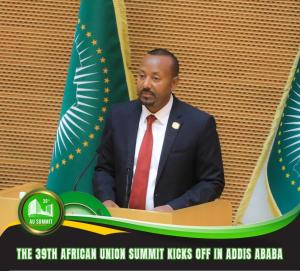
.jpg)
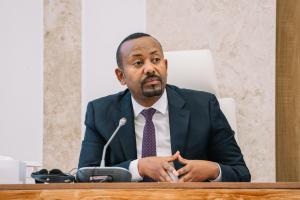
.jpg)
.jpg)
.jpg)
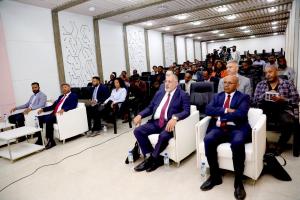


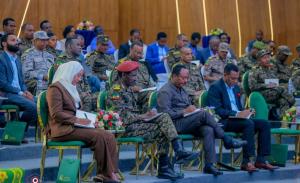
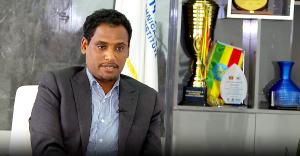

.jpg)